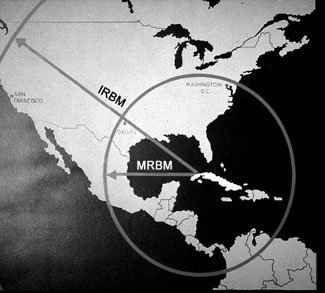FORECAST
The U.S.’ planned European missile defense shield, a principal feature of the Bush administration’s foreign policy, appears destined for the dustbin after Barack Obama’s recent presidential election victory.
Friday, at a summit with Russian President Dmitry Medvedev, France’s President Nicolas Sarkozy warned Washington that deployment of the planned missile defence shield would not only fail to bring security to Europe, but heighten tensions, complicate international relations and, inevitably, cause greater insecurity for the continent. France is a European power, major American ally and currently holds the European Union presidency. Thus its newly declared opposition to the missile defense plan is a major blow to President Bush’s foreign policy legacy.
Interestingly, President Sarkozy is much more closely aligned to President Bush than his predecessor Jacques Chirac, and until now, had publicly supported Bush’s foreign policy while simultaneously forging France’s own independent foreign policy initiatives. Thus, the direct challenge to Bush’s most ambitious foreign policy agenda for Europe from his close ally Sarkozy is best explained by the recent triumph of President-elect Barack Obama, who, although not opposed to the missile shield, has expressed scepticism about its technical feasibility while endorsing the intent to “explore the possibility”.
In fact, it was just hours after Obama’s presidential victory that Sarkozy’s partner at Friday’s Franco-Russian summit announced his response to the US missile defense shield proposal: President Medvedev declared Russia’s intent to deploy its own Iskander missiles in the Baltic Sea region of Kalinigrad close to Poland’s border as a countermeasure. Russia’s intention of breaking the US missile defense shield (thereby maintaining its nuclear deterrent capacity) reverses decades of European demilitarization, a prospect that will certainly cause further estrangement within the Euro-American alliance.
Indeed, Sarkozy has already intimated that he intends to discuss the matter with his NATO allies and, thereafter, hold a pan-European security conference under the auspices of the Organization for Security and Cooperation in Europe (OSCE), which includes Russia as a member. Surely the latter group will oppose the remilitarization of Europe through the US missile defense shield, and it is increasingly likely that NATO allies in Europe, particularly Western Europe (those derisively referred to as “old Europe” by past US Defence Secretary Donald Rumsfeld), will also split the Euro-American defense alliance.
And Obama cannot further his foreign policy agenda, particularly in Europe, without increased NATO cooperation. More than likely, NATO members from Western Europe will propose a quid pro quo arrangement to Obama: reverse Bush’s course on remilitarizing Europe and we will slow down our troop withdrawals from Afghanistan.
Russia, for its part, has already conceded it will reciprocate if Obama abandon’s Bush’s plan to remilitarize Europe by cancelling its own plans to deploy missiles in Kalinigrad.
Yet it may be economic concerns that determine the outcome of this crisis. Russia and Europe conducted 100 billion Euros in trade last year, and it is doubtful that European powers are willing to threaten that trade, especially in light of the recent global recession. The EU is Russia’s number one client and investor, while Russia remains Europe’s primary energy source. No doubt anxieties over funding a renewed cold war military build-up in Europe is also a deterrent to most European nations.
Beyond economics, Russia is playing other cards as well. With its Security Council veto, it has announced that it would oppose any fresh sanctions against Iran. Meanwhile, Medvedev is scheduled to visit later this month, two other states at loggerheads with the US: Cuba and Venezuela (Russia having recently agreed to upgrade Venezuela’s military).
Almost certainly, Russia will continue to play its confrontation cards, compelling Obama to accept a reciprocal agreement to retain the current demilitarization status quo in Europe in exchange for cooperation with Obama’s professed internationalist agenda.
Feels eerily similar to the Cuban missile crisis half-a-century ago, just this time, it looks like the dénouement will precede the climax.
SUMMARY OF EVENTS: November 10 – 17, 2008
WORLD
Oil prices fell to their lowest level in 20 months on Tuesday, despite efforts by the OPEC cartel to stem the slide, as weak economic growth continued to reduce consumption around the world.
The role of the United States as the world’s economic leader will be tested this weekend when 20 significant world leaders meet in Washington to address the global financial crisis.
NORTH AMERICA
United States
The United States military since 2004 has used broad, secret authority to carry out nearly a dozen previously undisclosed attacks against Al-Qaeda and other militants in Syria, Pakistan and elsewhere, according to senior American officials.
The Federal Reserve is refusing to identify the recipients of almost $2 trillion of emergency loans from American taxpayers or the troubled assets the central bank is accepting as collateral.
The International Atomic Energy Agency (IAEA) has obtained evidence suggesting that U.S.-acquired documents that have been described as technical studies for a secret Iranian nuclear weapons-related research program may have been fabricated.
When Barack Obama takes the oath of office on January 20, Americans won’t just get a new president; they might finally learn the full extent of George W. Bush’s warrantless domestic wiretapping.
Even as the company was pleading the federal government for another $40 billion dollars in loans, AIG sent top executives to a secret gathering at a luxury resort in Phoenix last week.
The State Department is preparing to slap a multi-million dollar fine on private military contractor Blackwater USA for shipping hundreds of automatic weapons to Iraq without the necessary permits.
Using Unmanned Aerial Vehicles (UAV’s) and Space-Based Domestic Spying Surveillance technology, the U.S. Government is now watching American citizens under the guise of disaster management and controlling the U.S. Mexican border.
The US government abandoned plans to buy up the toxic mortgage assets at the heart of the global financial crisis, a reversal that helped send ailing world markets spiralling even lower.
In the six weeks since lawmakers approved the Treasury’s massive bailout of financial firms and the government poured money into the country’s largest banks and businesses, no formal action has been taken to fill the independent oversight posts established by Congress when it approved the bailout to prevent corruption and government waste.
President George W. Bush appears likely to claim executive privilege in blocking subpoenas after he leaves office, according to a report Wednesday.
The United States criticized on Thursday Russian threats to deploy tactical missiles near the Polish border and the NATO military alliance said it would press for closer ties with Ukraine.
A federal grand jury in North Carolina is investigating allegations the controversial private security firm Blackwater USA illegally shipped assault weapons and silencers to Iraq, hidden in large sacks of dog food, ABCNews.com has learned.
WESTERN EUROPE
Western powers have questioned an International Atomic Energy Agency offer to help Syria look into building a nuclear power plant while it is under investigation for alleged covert atomic activity, diplomats said on Friday.
EASTERN EUROPE
Belarus
Belarusian President Alexander Lukashenko has weighed in on the Russia-U.S. dispute over missile defense, telling a U.S. paper his country could deploy tactical missiles capable of striking Central Europe.
Russia
Russian Prime Minister Vladimir Putin said on Monday that the country must develop a set of measures to influence world oil prices.
Cuban President Raul Castro will visit Russia next year, the Kremlin said on Tuesday, in a new sign that Moscow is reviving a Cold War-era trade and military alliance.
The Kremlin on Wednesday rejected U.S. proposals aimed at easing concerns over a missile defense system in Europe and said it would try again to resolve the row once Barack Obama is in the White House.
MIDDLE EAST
Iran
Iran said it test-fired a new generation of surface-to-surface missile on Wednesday and that the Islamic Republic was ready to defend itself against any attacker.
Israel
The Israeli army decided to keep all the border crossings with the Gaza Strip closed on Thursday after receiving intelligence indicating that Palestinian militants were planning to attack a border terminal, local daily Ha’aretz reported.
Iraq
Royal Dutch Shell oil company and the Iraqi Oil Ministry have struck a secret, as-of-yet non-binding agreement that gives a monopoly over southern Iraq’s natural gas to the energy giant. It marks the first time in over 35 years a Western oil company has played a major role in the country’s most lucrative industry.
AFRICA
Democratic Republic of Congo
Rebels in eastern Democratic Republic of Congo swept to the outskirts of a strategic crossroads town Thursday where hundreds of government troops and UN peacekeepers stood in their way.
Rwanda
Rwanda is poised to issue indictments and arrest warrants against 23 French military and political officials over their suspected role in the country’s 1994 genocide, judicial sources said on Tuesday.
Zimbabwe
Zimbabwe’s main opposition party said Friday it will not join a unity government with President Robert Mugabe until the rivals resolve their differences over a power-sharing deal.
Manjit Singh is a contributor to Geopoliticalmonitor.com



